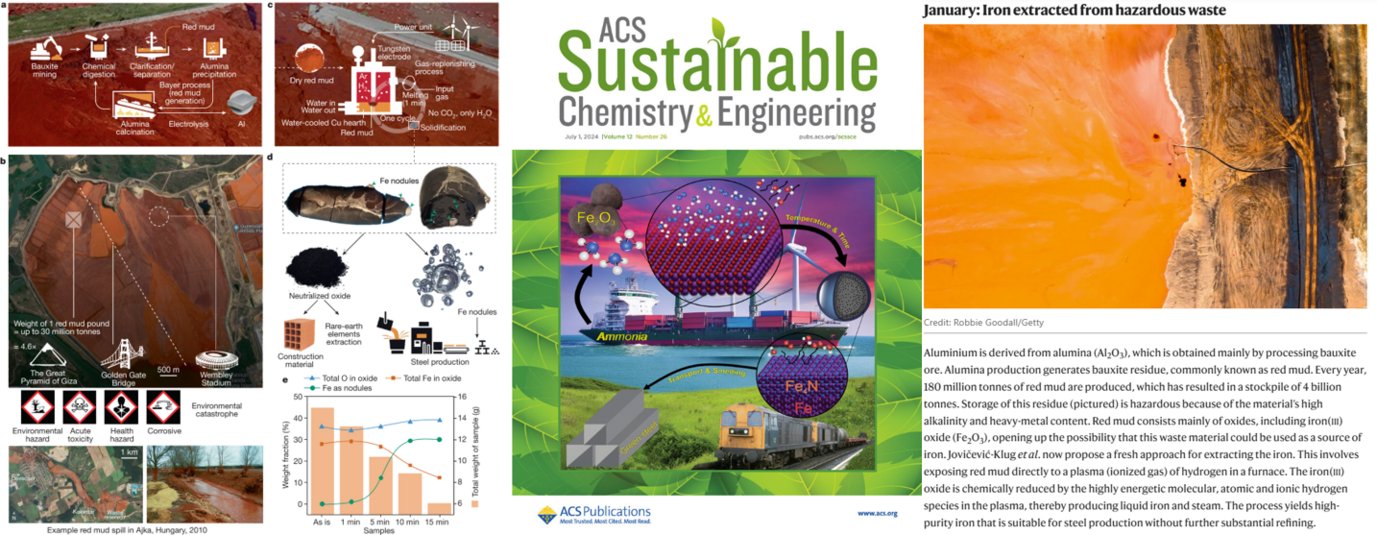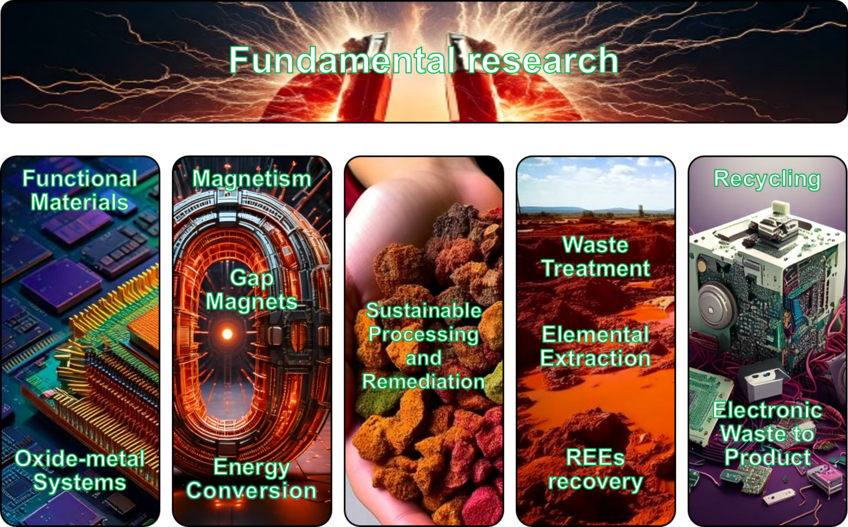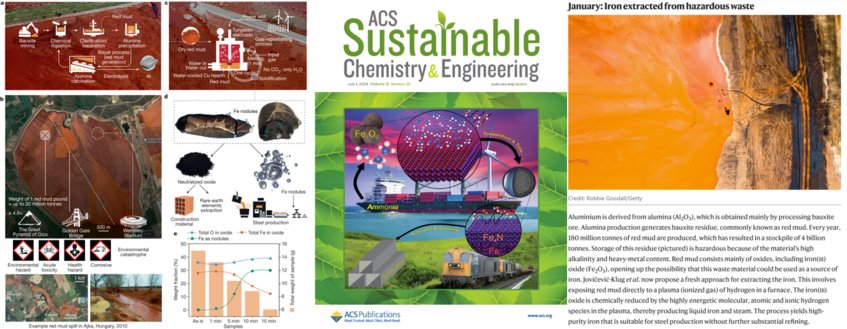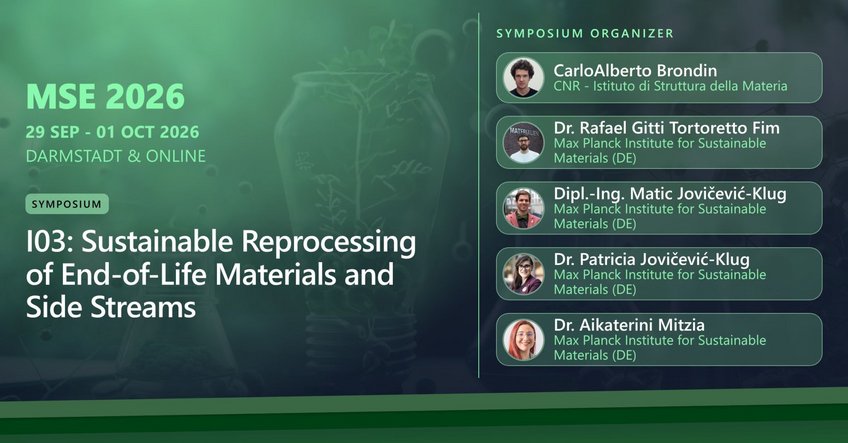
Sustainable Magnets and Recycling
The group focuses on advancing the sustainability of magnetic materials and their processing as well as improving the sustainability perspectives of materials recycling and elemental extraction. Ultimately the group strives to provide new understanding and fundamentals for developing the two research perspectives with respect to low-CO2 technologies and cost-effective processes for future materials designing. The group scientifically focuses on providing new experimental and theoretical understanding to bridge sustainability, magnetism and recycling into a common research field in relation to both production of new materials as well as re-use of decommissioned, scrap and waste material.
Current technology and sustainable efforts for decarbonization of the world rely strongly on the availability of magnetic materials due to their direct use in electric motors, transformers and data storage devices. With the market size estimated at around 40 billion EUR and rapid annual growth of about 9 %, the magnetic materials are delivering a high impact on the future development of society and technology. Much like alloys, magnetic materials also offer a large variety of properties based on their chemistry, crystallography and structure. In turn, such versatility allows corresponding tailoring of extrinsic magnetic and physical properties required for individual applications. As a result, a large and complex assembly of magnets are available on the market that after their lifetime need to be properly recycled and/or re-used. Currently, the main challenge of magnetic materials lies within two perspectives. (1) Production of magnets with low CO2 emission and reduced amount of rare earth elements used in them couple with low costs and high performance. (2) Sustainable recycling of magnetic materials with high efficiency, low costs and low consumption of resources and energy. Both points are extremely important in the field of permanent magnets due to the high sensitivity of magnetic properties to defects, impurities, grain boundaries and restructuring of the material that are challenging to control within a single process on a bulk scale. Additionally, when magnetic materials are considerably oxidized or mixed with impurity materials, their corresponding recycling routes are usually limited to hydrometallurgical extraction that are both high CO2 intensive as well as detrimental to the environment due to the use of excessive amounts of environmentally-hazardous chemicals.
Comparatively, the recycling aspects of permanent magnets extends also to other material classes such as smart materials, electronics, batteries as well as simply raw alloys and base materials. Similarly, to the permanent magnets, many recycling processes of such materials are based on chemical-based processes that despite their reasonable costs can be both CO2-intensive and environmentally damaging. For all materials the recycling topic ranges beyond the materials themselves to also the by-products and waste material obtained from the production and subsequent processing of the sought-out material. These additional products can be on the one hand considerably detrimental to the environment and on the other they can hold highly-valuable compounds and elements that are fundamental for the progress of society and technology.
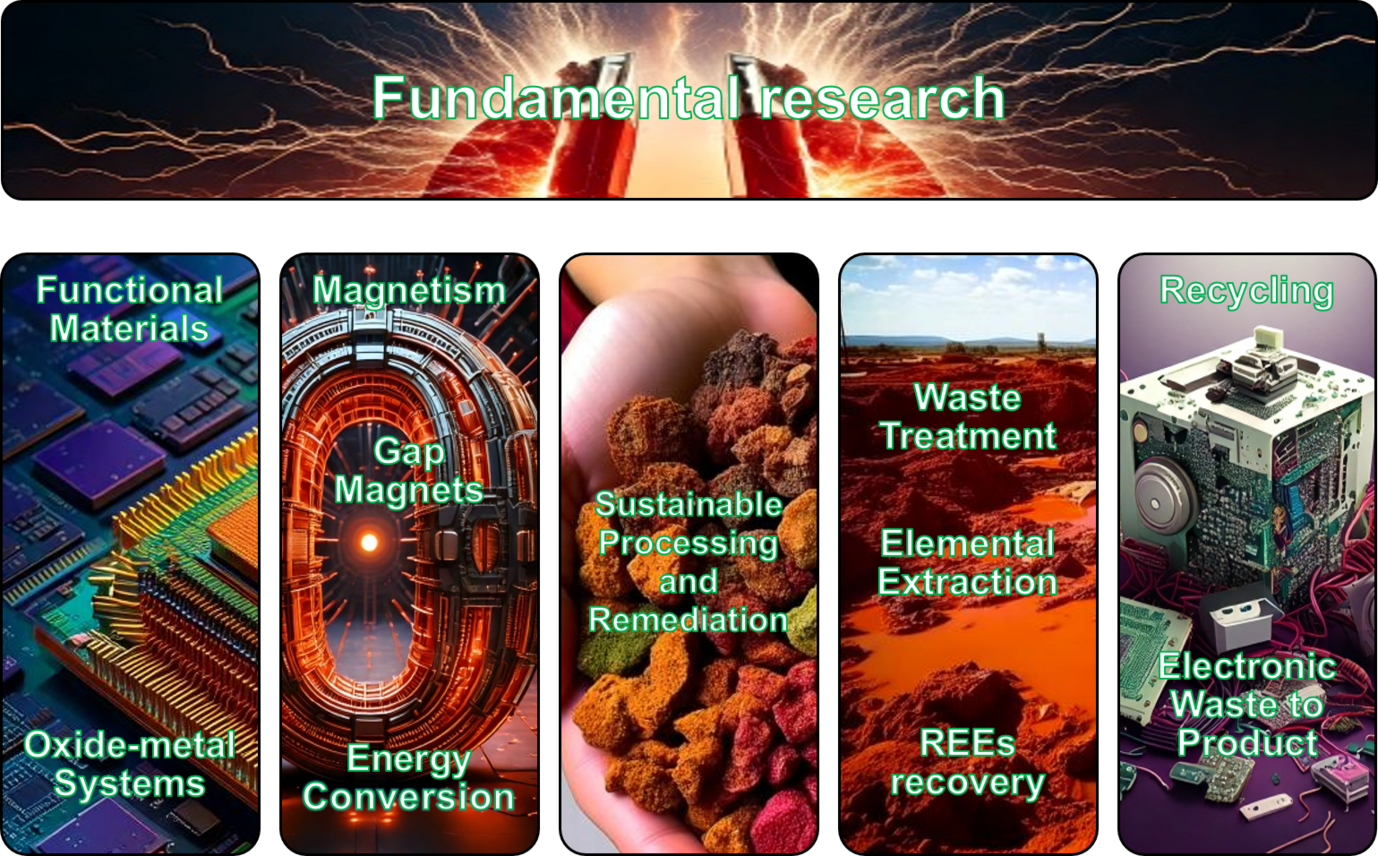
With both topics in mind, the new group addresses the necessary development of new processes and technology to perform both material production and recycling in a novel and sustainable manner with low CO2 emissions. By focusing on unconventional pathways and materials, the group aims at pioneering novel theoretical, practical and cost-effective development of material processing and engineering that will enable future sustainable technology for material extraction, production and recycling. The major vision of the group would be to focus on the missing key research elements that can be supplied through experimental and theoretical know-how from material synthesis and processing to propel the new ideas and technology integration into the field of magnetics and recycling.
The group acts as connecting entity between several groups through strong synergetic collaboration with the groups of:
- Surface Science for Future Materials
- Sustainable Synthesis of Materials
- "De Magnete - Designing Magnetism on the Atomic Scale"
- Atom Probe Tomography,
- RWTH University Partner Group Sustainable Material Science and Technology
- Corrosion
- Theory and Simulation
- Defect Chemistry and Spectroscopy
- Microscopy and Diffraction
- Mechanism-based Alloy Design
National and international collaborators:
- WEEE Forum, Belgium
- EIT Raw Materials, Belgium
- Fraunhofer IWKS, Germany
- TU Darmstadt, Germany
- University of Kiel, Germany
- Synchrotron Elettra and FERMI, Italy
- National Research Council of Italy (CNR)
- Forschungszentrum Jülich, Germany
- Tehnische Hochschule Georg Agricola, Germany
- Zollverein - UNESCO, Germany
- DLR, Germany
- BAM, Germany
- Heinrich Heine University Düsseldorf, Germany
- InnoRenew CoE, Slovenia
- Sungkyunkwan University, South Korea
- Australian Nuclear Science and Technology Organisation (ANSTO), Australia
- University of Sydney, Australia
- University of Bochum
- The French Alternative Energies and Atomic Energy Commission (CEA)
- TU Bergakademie Freiberg
- Victoria University of Wellington
Past Conferences
- WIEM 2025, Jülich, Germany
- MCConference 2025, Karlsruhe, Germany
- JEMS 2025, Frankfurt, Germany
- REPM 2025, Tsukuba, Japan
- 4th Materials Science Colloquium 2025, Arlberg, Austria
- SAS 2024, Taipei, Taiwan
- IEEE AtC-AtG Magnetics Conference 2024, online
- MSE 2024, Darmstadt, Germany
- EUROCORR 2024, Paris, France
- https://www.arte.tv/de/videos/121214-000-A/stahl-aus-gefaehrlichem-eisenschlamm-abfall/
- https://www.mpg.de/21440660/rotschlamm-aluminiumindustrie-gruener-stahl
- https://www.mpg.de/22060047/yearbook-highlights-2023.pdf
